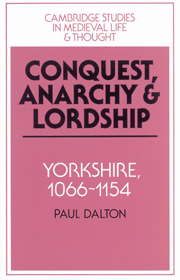Book contents
- Frontmatter
- Contents
- List of maps
- List of tables
- Acknowledgments
- List of abbreviations
- INTRODUCTION
- 1 THE NORMAN CONQUEST OF YORKSHIRE
- 2 THE TRANSFORMATION OF YORKSHIRE 1066–1135: TERRITORIAL CONSOLIDATION AND ADMINISTRATIVE INTEGRATION
- 3 THE TRANSFORMATION OF YORKSHIRE 1086–1135: MILITARY ENFEOFFMENT AND MONASTERIES
- 4 THE REIGN OF STEPHEN
- 5 THE SCOTS IN THE NORTH
- 6 CARTAE BARONUM, NEW ENFEOFFMENTS AND THE NATURE OF THE HONOUR
- 7 THE FIRST CENTURY OF ENGLISH FEUDALISM
- Tables
- Select bibliography
- Cambridge Studies in Medieval Life and Thought
- Index
- Frontmatter
- Contents
- List of maps
- List of tables
- Acknowledgments
- List of abbreviations
- INTRODUCTION
- 1 THE NORMAN CONQUEST OF YORKSHIRE
- 2 THE TRANSFORMATION OF YORKSHIRE 1066–1135: TERRITORIAL CONSOLIDATION AND ADMINISTRATIVE INTEGRATION
- 3 THE TRANSFORMATION OF YORKSHIRE 1086–1135: MILITARY ENFEOFFMENT AND MONASTERIES
- 4 THE REIGN OF STEPHEN
- 5 THE SCOTS IN THE NORTH
- 6 CARTAE BARONUM, NEW ENFEOFFMENTS AND THE NATURE OF THE HONOUR
- 7 THE FIRST CENTURY OF ENGLISH FEUDALISM
- Tables
- Select bibliography
- Cambridge Studies in Medieval Life and Thought
- Index
Summary
The hundred years after 1066, which Stenton termed the ‘first century of English feudalism’, was full of remarkable developments which dramatically changed the nature of society. This book is a study of three of the most important of these developments: the Norman conquest, the anarchy of King Stephen's reign and the transformation in the nature of lordship and land tenure. Its aim is to contribute to our understanding of these developments by examining them within a county context. The county to be studied is Yorkshire, by far the largest in England.
The first three chapters reassess the nature and impact of the Norman conquest of Yorkshire. Employing a novel approach to the interpretation of the evidence of Domesday Book, Chapter 1 argues that the conquest was a more rapid and controlled process than has hitherto been supposed, and one in which the construction of castles formed a key element. In doing so, it suggests that the level of destruction in Yorkshire attributed to the famous harrying of the north has been overestimated, and makes a contribution to the recent debate concerning the effect of the conquest on patterns of land tenure. Chapter 2 reveals that under the Conqueror's successor, William Rufus, the size and number of the Norman lordships was deliberately increased, so that they covered the entire county and consolidated Norman tenurial domination there.
- Type
- Chapter
- Information
- Conquest, Anarchy and LordshipYorkshire, 1066–1154, pp. 1 - 18Publisher: Cambridge University PressPrint publication year: 1994



